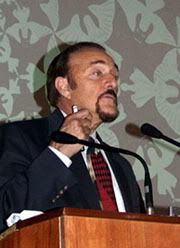This started as a comment in response to
Dogs, Doorwalls and Dianisms at My Left Wing. Somewhere along the way, the comment got long enough to actually be a post. That doesn't seem to happen to often lately, so I decided to go with it...
One of the things that has been on my mind this fall is the sacredness of my connection to one of my dogs. It hasn't been easy to put into words, but I took a shot when my brother and I took Brady and Winnie to the dog park over the Thanksgiving weekend.
In part this has been prompted by my realization that Brady, the collie, must be around 10 years old at this point. I hadn't really given his age much thought--while the changes in my kids have been hard to miss, Brady always seems the same to me. It was only once he started to show some stiffness upon getting up that I really gave his age much thought.
Then there was last month's retreat. Its theme of Celtic spirituality (emphasizing nature and animals) served to reinforce the notion that I had some spiritual "work" to do centering around my relationship with Brady. There's just this amazing connection between us--sometimes it seems like he can read my thoughts.
Yet he always seems to be "underfoot", and our son in particular doesn't like the dogs around him. Winnie can go lie down somewhere when she's not wanted around, but Brady picks up on people's moods, and if anyone is emitting any "upset" vibes, he just *has* to be right there. (Winnie has that same sense of compulsion if she detects the presence of food.)
Anyway, the easiest way to restore some sense of calm or order is usually to just put Brady out in the yard. Over the years, he's spent a
lot of time in the yard.
When I first got Brady, I took him to obedience classes once a week. We went through the beginner's class, and then intermediate. He earned his "Canine Good Citizen" certificate. The goal had been to eventually get involved with animal assisted therapy as a volunteer activity we could do together.
But then I got into animal rescue. Then I got
out of animal rescue, but not without acquiring a second dog. Once I had two dogs, I was less inclined to take Brady "out" anywhere, and felt less compelled to do so, since the two dogs had each other.
Late this summer, I found out that there is a free (meaning no charge--you can just show up rather than paying for a membership) off-leash dog park in a suburb of Columbus. The first time I took Brady there, I was just blown away by the utter joy I could see in him. It had been ages since I'd seen him genuinely
happy. His most characteristic mood for some time before that, had been "worried". Worried about the "pack", the family. I decided that I needed to make an effort to take him out more often. Like I should have been doing all along, but I'd stopped at some point. And dogs are so darn forgiving and accomodating, aren't they?
Earlier this fall, when I was working on a temp project and teaching three classes, I was sometimes too tired to get up for church by the time Sunday rolled around. On one such Sunday, when I had failed to get myself to church
or the gym, I decided that taking Brady to the dog park could take the place of both that day. I was starting to think of time with Brady as a form of spiritual practice.
Boy, if
that doesn't sound like some sort of namby-pamby watered-down progressive version of religion, I don't know what does.
But this is bigger than just "doing right by the collie", I've come to realize. It's about living more deliberately, acting rather than just
reacting. Actually stopping to make
choices rather than just allowing myself to be pushed along by life's currents. And that applies to my personal life as well as any involvement I
choose to have in the "public square", whether that ends up being political or quasi-political or--whatever. But, as I mentioned
here, all I know is that I'm committed to doing something to help make the world a better place.
Yet it's too easy for me to allow "the prevailing mood", whether it be on blogs, or in the media--or just my kids sniping at each other--to distract me from focusing on that goal. And now, with the artificial "frenzy" of the holiday season added into the mix, I could really use some help with this. I'm
sure I can't be the only one dealing with this. So, I'm thinking that this would be a good time for those who are kindred spirits in feeling this way to come together and support each other. And help each other find strength, patience, humor, and perspective for the journey.



